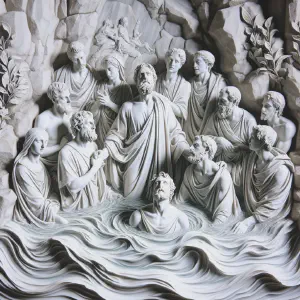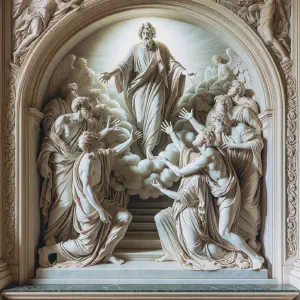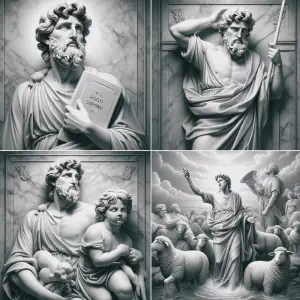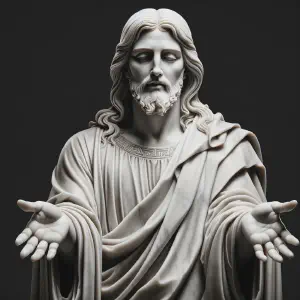The Journey of the Faithful



In a moment of divine proclamation, the faithful are beckoned to embrace their heavenly inheritance. Prepared since the world’s foundation, this kingdom is a promise of eternal fellowship with the Father, a reward for those graced by His blessing. Jesus, the emissary of divine will, assures the multitudes of God’s unwavering plan. None who seek Him shall be turned away, for His mission is rooted in celestial decree. The Father’s will is clear: to safeguard all that He entrusts to the Son, ensuring that each believer is resurrected on the last day. This promise of eternal life is the cornerstone of faith, a beacon of hope for all who look upon the Son and believe. In this journey of the faithful, the scriptures weave a tapestry of divine love and eternal promise, guiding believers through trials towards a celestial home, where peace, love, and grace abound forevermore.
Five Questions
What is the significance of the souls of the just being in the hand of God, as mentioned in Wisdom 3:1-9?
The passage from Wisdom 3:1-9 highlights the divine protection and favor granted to the righteous. Being in the hand of God symbolizes ultimate safety and care. It reassures believers that, despite worldly misunderstandings or hardships, the just are valued and safeguarded by God. This reflects a deep trust in God’s providence and justice, affirming that true peace and reward await the righteous beyond earthly trials.
How does Psalm 23 depict the relationship between God and the faithful?
Psalm 23 beautifully illustrates the relationship between God and His followers through the metaphor of a shepherd and his sheep. This imagery portrays God as a caring, guiding, and protective presence. The Psalm reassures believers that with God, they lack nothing. Even in the darkest or most challenging times, symbolized by the ‘valley of darkness,’ the faithful are not alone; God’s guidance and comfort are always present, symbolized by the rod and staff.
In Romans 6:3-9, how does baptism relate to the themes of death and resurrection?
Romans 6:3-9 draws a profound parallel between baptism and Christ’s death and resurrection. Baptism is not just a symbolic act; it’s a spiritual union with Christ. By being baptized, Christians are believed to die to their old, sinful selves and be reborn into a new life of righteousness. This passage teaches that just as Christ was resurrected, so too are Christians called to live a resurrected life – free from the bondage of sin and alive in the grace of God.
How does John 6:37-40 contribute to the understanding of Jesus’ mission and God’s will?
John 6:37-40 centers on the theme of salvation and the fulfillment of God’s will through Jesus. It emphasizes Jesus’ commitment to not reject anyone who comes to Him, underlining the inclusiveness of His mission. This passage also clarifies that Jesus’ purpose is to enact the will of the Father, which is to grant eternal life to all who believe in the Son. It assures believers of the resurrection on the last day, anchoring the Christian hope in the promise of eternal life.
What overarching message do these scriptures convey about faith, suffering, and eternal life?
These scriptures collectively convey a message of hope and reassurance in the face of suffering and death. They teach that while the righteous may face misunderstanding and hardship in this life, they are under God’s loving care and protection. The themes of resurrection and eternal life are central, offering a perspective that transcends earthly struggles. These passages call for a steadfast faith in God’s plan, a hope in the resurrection, and an assurance of eternal life for those who trust in God’s grace and mercy.
Bible Study
Wisdom 3:1-9
The souls of the just are in the hand of God,
and no torment shall touch them.
They seemed, in the view of the foolish, to be dead;
and their passing away was thought an affliction
and their going forth from us, utter destruction.
But they are in peace.
For if before men, indeed, they be punished,
yet is their hope full of immortality;
chastised a little, they shall be greatly blessed,
because God tried them
and found them worthy of himself.
As gold in the furnace, he proved them,
and as sacrificial offerings he took them to himself.
In the time of their visitation they shall shine,
and shall dart about as sparks through stubble;
they shall judge nations and rule over peoples,
and the Lord shall be their King forever.
Those who trust in him shall understand truth,
and the faithful shall abide with him in love:
because grace and mercy are with his holy ones,
and his care is with his elect.
This passage presents a theology of suffering and divine justice. It contrasts earthly perceptions of death and affliction with the reality of divine providence and eternal life. The ‘just’ or righteous individuals, although not specifically named, are depicted as faithful servants enduring trials. The passage aligns with Catholic teachings on the value of suffering, the promise of eternal life, and the beatific vision, echoing the principles of hope and divine justice found in the Catechism of the Catholic Church.
Psalm 23:1-6
The LORD is my shepherd; I shall not want.
In verdant pastures he gives me repose;
beside restful waters he leads me;
he refreshes my soul.
He guides me in right paths
for his name’s sake.
Even though I walk in the dark valley
I fear no evil; for you are at my side
with your rod and your staff
that give me courage.
You spread the table before me
in the sight of my foes;
You anoint my head with oil;
my cup overflows.
Only goodness and kindness follow me
all the days of my life;
and I shall dwell in the house of the LORD
for years to come.
Psalm 23, attributed to King David, a central biblical figure known for his deep faith and poetic expressions, reflects trust and confidence in God’s guidance and protection. This Psalm aligns with Catholic teachings on God’s providential care, as seen in the imagery of God as a shepherd. It resonates with the themes of divine guidance, protection in times of trial, and the promise of eternal life, paralleling the Catholic understanding of God’s unceasing presence and care as outlined in various Church teachings and the Acts of Mercy.
Romans 6:3-9
Are you unaware that we who were baptized into Christ Jesus
were baptized into his death?
We were indeed buried with him through baptism into death,
so that, just as Christ was raised from the dead
by the glory of the Father,
we too might live in newness of life.
For if we have grown into union with him through a death like his,
we shall also be united with him in the resurrection.
We know that our old self was crucified with him,
so that our sinful body might be done away with,
that we might no longer be in slavery to sin.
For a dead person has been absolved from sin.
If, then, we have died with Christ,
we believe that we shall also live with him.
We know that Christ, raised from the dead, dies no more;
death no longer has power over him.
St. Paul, an apostle known for his theological insights and missionary work, addresses the transformative power of baptism in this passage. It aligns with Catholic doctrine on the sacraments, especially baptism, which is seen as a death to sin and a rebirth in Christ. This concept is deeply rooted in Catholic teachings on grace, redemption, and the resurrection, as found in the Catechism. The passage emphasizes the Catholic belief in the salvific power of Jesus’ death and resurrection and the call to live a new life free from the bondage of sin.
Matthew 25:34
Come, you who are blessed by my Father.
Inherit the kingdom prepared for you from the foundation of the world.
Matthew 25:34, spoken by Jesus, represents a culmination of His teachings on judgment and the reward for the righteous. This passage aligns with Catholic values of mercy, charity, and the ultimate reward of heaven for those who follow God’s will, as detailed in the Catechism and the Beatitudes. It encapsulates the Catholic understanding of divine justice and mercy, emphasizing the importance of living a life in accordance with God’s commandments and the acts of mercy.
Lessons
These passages collectively impart profound lessons on faith, hope, and divine grace. The souls of the just, though misunderstood by the world, are under the protective hand of God, untouched by worldly tribulations and destined for immortality. The metaphor of the Lord as a shepherd in Psalm 23 reassures us of His guidance and providential care, even in the darkest moments of life. Romans 6:3-9 teaches us about the transformative power of baptism, uniting us with Christ in His death and resurrection, releasing us from the bonds of sin and leading us to a new life in Christ. Finally, John 6:37-40 emphasizes the inexorable will of God to save and raise those who believe in the Son, promising eternal life. These scriptures call us to a deepened faith, inspiring hope in the resurrection and life everlasting through the grace and mercy of our Lord.
Meditation Prayer



And in the words of Your Son, Jesus Christ, we are called to inherit the kingdom prepared from the foundation of the world. May this promise encourage us to act with mercy and kindness, not only seeking personal prosperity but also contributing to the well-being of those around us, enhancing emotional and mental health through acts of love and charity. Lord, let these readings be a beacon in our lives, guiding our actions and thoughts. May they remind us to live in accordance with Your divine will, actively engaging in works of mercy, spreading Your love and light in our communities, and striving to be worthy of the eternal life promised to us. In Your Holy Name, we pray. Amen.